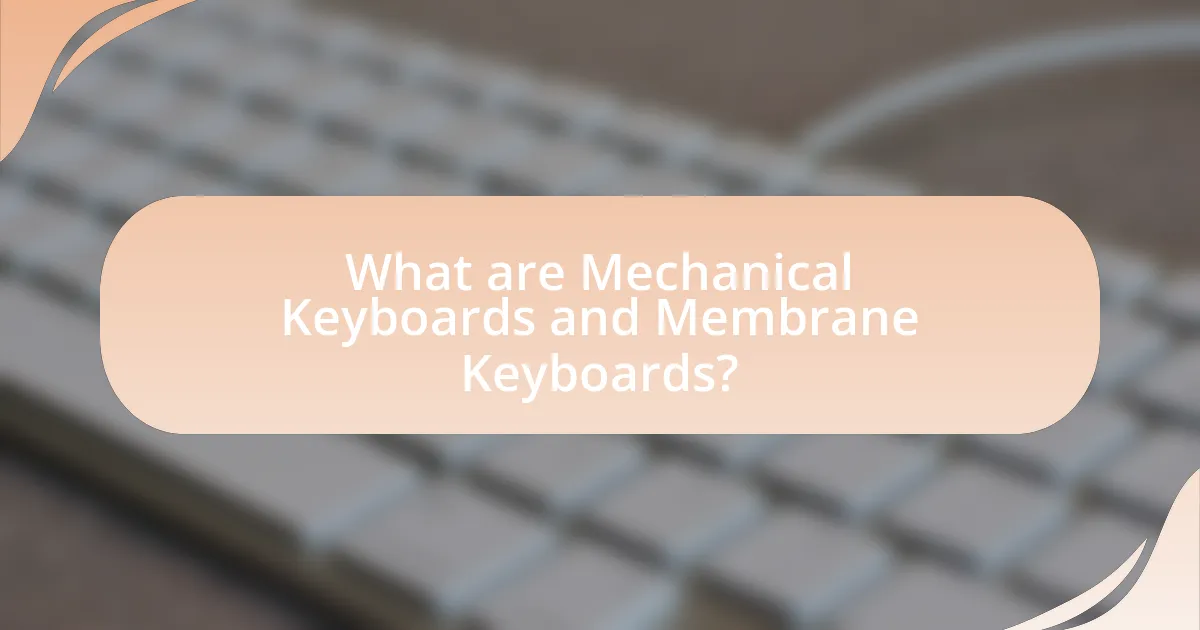Mechanical keyboards and membrane keyboards are two distinct types of input devices, each with unique features and user experiences. Mechanical keyboards utilize individual mechanical switches for each key, offering tactile feedback, durability, and a lifespan of up to 50 million keystrokes, making them popular among gamers and typists. In contrast, membrane keyboards employ a pressure pad system with a shorter lifespan of around 5 million keystrokes, providing a quieter typing experience and lower cost, appealing to casual users and budget-conscious consumers. This article explores the differences between these keyboard types, their key components, advantages and disadvantages, and guidance on selecting the right keyboard based on user needs and preferences.

What are Mechanical Keyboards and Membrane Keyboards?
Mechanical keyboards are input devices that use individual mechanical switches for each key, providing tactile feedback and durability. These keyboards are known for their longevity, often rated for tens of millions of keystrokes, and they offer a variety of switch types that cater to different preferences in feel and sound. In contrast, membrane keyboards utilize a pressure pad system with a single rubber dome layer beneath the keys, resulting in a quieter typing experience but generally less tactile feedback and shorter lifespan, typically rated for around five million keystrokes. The differences in construction and functionality between mechanical and membrane keyboards significantly influence user experience, with mechanical keyboards often favored by gamers and typists for their responsiveness and customization options.
How do Mechanical Keyboards differ from Membrane Keyboards?
Mechanical keyboards utilize individual mechanical switches for each key, providing tactile feedback and durability, while membrane keyboards rely on a pressure pad system that registers key presses through a rubber dome. Mechanical switches typically last for tens of millions of keystrokes, whereas membrane keyboards generally have a shorter lifespan, often around five million keystrokes. This difference in construction leads to distinct typing experiences, with mechanical keyboards offering more precise actuation and a customizable feel, while membrane keyboards are often quieter and more cost-effective.
What are the key components of Mechanical Keyboards?
The key components of mechanical keyboards include switches, keycaps, a printed circuit board (PCB), a case, and stabilizers. Switches are the primary mechanism that registers key presses, with various types such as Cherry MX, Razer, and Kailh, each offering different tactile feedback and actuation forces. Keycaps are the removable tops of the switches, typically made from plastic, and can vary in shape, size, and material, affecting both aesthetics and feel. The PCB connects the switches to the computer, translating key presses into signals. The case houses all components, providing structural integrity and protection. Stabilizers are used for larger keys like the spacebar and enter key to prevent wobbling and ensure a consistent feel. These components collectively contribute to the performance, durability, and user experience of mechanical keyboards.
What are the key components of Membrane Keyboards?
The key components of membrane keyboards include a flexible membrane layer, a printed circuit board (PCB), and a top layer with printed symbols. The flexible membrane layer consists of multiple layers that compress when a key is pressed, completing a circuit on the PCB. The PCB is responsible for registering the key presses and sending the corresponding signals to the computer. The top layer features the printed symbols that indicate the function of each key. These components work together to provide the keyboard’s functionality, making membrane keyboards a cost-effective option for users.
What are the primary uses of Mechanical and Membrane Keyboards?
Mechanical keyboards are primarily used for gaming, typing, and programming due to their tactile feedback and durability, while membrane keyboards are commonly utilized for general office tasks and casual use because of their quieter operation and lower cost. Mechanical keyboards feature individual mechanical switches for each key, providing a more responsive and customizable experience, which is favored by gamers and professionals who require precision. In contrast, membrane keyboards use a pressure pad system, making them less expensive and suitable for everyday tasks where high performance is not critical.
Which user groups prefer Mechanical Keyboards?
Gamers, typists, and programmers are the primary user groups that prefer mechanical keyboards. Gamers favor mechanical keyboards for their tactile feedback and faster response times, which enhance gaming performance. Typists appreciate the durability and comfort of mechanical switches, often leading to improved typing speed and accuracy. Programmers benefit from the customizable key switches and ergonomic designs that mechanical keyboards offer, allowing for extended use without discomfort. These preferences are supported by market trends indicating a significant rise in mechanical keyboard sales among these groups, reflecting their specific needs for performance and comfort.
Which user groups prefer Membrane Keyboards?
Casual users and budget-conscious consumers prefer membrane keyboards. These user groups favor membrane keyboards due to their lower cost, quieter operation, and sufficient functionality for everyday tasks such as typing, browsing, and office work. Research indicates that membrane keyboards are often chosen by individuals who prioritize affordability and basic performance over advanced features, making them a popular choice in home and office environments.

What are the Advantages and Disadvantages of Each Type?
Mechanical keyboards offer advantages such as tactile feedback, durability, and customizable key switches, making them ideal for typists and gamers who prefer a responsive experience. Their lifespan can exceed 50 million keystrokes, significantly outlasting membrane keyboards. However, they tend to be more expensive and can be noisier, which may not suit all environments.
In contrast, membrane keyboards are generally quieter, more affordable, and have a compact design, making them suitable for casual users and those with limited desk space. They are also lighter and often come with integrated features like multimedia controls. The downside is that they typically have a shorter lifespan, around 5 million keystrokes, and lack the tactile feedback that many users prefer, which can lead to a less satisfying typing experience.
What are the benefits of using Mechanical Keyboards?
Mechanical keyboards offer several benefits, including enhanced durability, improved typing experience, and customizable features. The durability of mechanical keyboards is evidenced by their individual mechanical switches, which can withstand tens of millions of keystrokes, significantly outlasting traditional membrane keyboards. Users often report a more satisfying typing experience due to tactile feedback and audible clicks, which can enhance typing speed and accuracy. Additionally, many mechanical keyboards allow for customization of key switches, keycaps, and backlighting, catering to personal preferences and ergonomic needs. These advantages make mechanical keyboards a preferred choice for gamers and typists alike.
How do Mechanical Keyboards enhance typing experience?
Mechanical keyboards enhance the typing experience by providing tactile feedback and customizable key switches that improve typing accuracy and speed. The distinct feel of mechanical switches, such as Cherry MX or Razer, allows users to feel when a key is actuated, reducing the likelihood of typing errors. Studies indicate that users can type faster and with fewer mistakes on mechanical keyboards compared to membrane keyboards, which often lack this feedback. Additionally, the durability of mechanical switches, rated for millions of keystrokes, ensures a longer lifespan, contributing to a consistent typing experience over time.
What are the potential downsides of Mechanical Keyboards?
The potential downsides of mechanical keyboards include their higher cost, increased noise levels, and greater weight compared to membrane keyboards. Mechanical keyboards typically range from $50 to over $200, making them a more expensive option for consumers. Additionally, the tactile feedback and audible clicks of many mechanical switches can be disruptive in quiet environments, which may not be suitable for shared workspaces. Furthermore, mechanical keyboards are often bulkier and heavier, making them less portable than their membrane counterparts, which can be a disadvantage for users who frequently travel or need a compact setup.
What are the benefits of using Membrane Keyboards?
Membrane keyboards offer several benefits, including affordability, quiet operation, and a compact design. Their cost-effectiveness makes them accessible for a wide range of users, as they are generally cheaper to produce than mechanical keyboards. The quiet operation is advantageous in shared environments, allowing for less disruptive typing. Additionally, the compact design of membrane keyboards often results in a lighter and thinner profile, making them easier to transport and suitable for limited desk space. These features collectively make membrane keyboards a practical choice for everyday use.
How do Membrane Keyboards provide value for casual users?
Membrane keyboards provide value for casual users primarily through their affordability and quiet operation. These keyboards typically cost less than mechanical keyboards, making them accessible for users who do not require advanced features or high durability. Additionally, membrane keyboards operate silently, which is beneficial in shared environments or for users who prefer a quieter typing experience. Their lightweight design and compact form factor also make them convenient for casual use, especially in portable setups.
What limitations do Membrane Keyboards have?
Membrane keyboards have several limitations, primarily related to their tactile feedback and durability. Unlike mechanical keyboards, membrane keyboards use a pressure pad system that lacks distinct key travel, resulting in a less satisfying typing experience and reduced accuracy. Additionally, membrane keyboards typically have a shorter lifespan, often rated for about 5 million keystrokes compared to mechanical keyboards, which can exceed 50 million keystrokes. This reduced durability can lead to quicker wear and malfunction, making them less suitable for heavy users or gamers.

How to Choose Between Mechanical and Membrane Keyboards?
To choose between mechanical and membrane keyboards, consider your typing preferences and usage needs. Mechanical keyboards offer tactile feedback and durability, making them ideal for gamers and heavy typists, while membrane keyboards are quieter and more affordable, suitable for casual use. Research indicates that mechanical keyboards typically last longer, with a lifespan of 50 million keystrokes compared to 5 million for membrane keyboards, which supports the choice for longevity and performance in demanding environments.
What factors should you consider when selecting a keyboard?
When selecting a keyboard, consider factors such as switch type, key feel, build quality, layout, and additional features. The switch type, whether mechanical or membrane, significantly affects typing experience and responsiveness; mechanical switches offer tactile feedback and durability, while membrane switches are quieter and often more affordable. Key feel relates to the texture and travel distance of the keys, impacting comfort during extended use. Build quality influences longevity and stability, with higher-quality materials providing better performance. The layout, including full-size, tenkeyless, or compact designs, should match your space and usage needs. Additional features like backlighting, programmable keys, and connectivity options can enhance functionality and user experience.
How does budget influence your choice between Mechanical and Membrane Keyboards?
Budget significantly influences the choice between mechanical and membrane keyboards, as mechanical keyboards typically cost more due to their complex construction and durable materials. Mechanical keyboards can range from $50 to over $200, while membrane keyboards are generally priced between $20 and $60. This price difference often leads consumers with limited budgets to opt for membrane keyboards, which provide adequate functionality for basic tasks. Additionally, the lower cost of membrane keyboards makes them more accessible for casual users or those who prioritize affordability over performance.
What role does typing style play in your keyboard selection?
Typing style significantly influences keyboard selection by determining the type of feedback and comfort a user requires. For instance, individuals who type with a light touch may prefer membrane keyboards due to their softer keys, while those who type with more force often favor mechanical keyboards for their tactile feedback and durability. Research indicates that mechanical keyboards can reduce typing fatigue and increase typing speed for users with a more aggressive typing style, as they provide distinct actuation points and resistance. This correlation between typing style and keyboard preference underscores the importance of selecting a keyboard that aligns with one’s specific typing habits to enhance overall productivity and comfort.
What are some tips for making the right choice?
To make the right choice between mechanical and membrane keyboards, consider your typing preferences and usage scenarios. Mechanical keyboards offer tactile feedback and durability, making them ideal for gamers and heavy typists, while membrane keyboards are quieter and more affordable, suitable for casual use. Research indicates that mechanical keyboards can last over 50 million keystrokes compared to membrane keyboards, which typically last around 5 million keystrokes. Additionally, assess factors such as key feel, noise level, and price to align your choice with your specific needs.
How can you test keyboards before purchasing?
To test keyboards before purchasing, visit a retail store that displays various keyboard models, allowing for hands-on experience. This enables you to assess factors such as key feel, actuation force, and noise level, which are crucial for determining personal preference. Additionally, typing on different keyboards can help identify the tactile feedback and responsiveness of mechanical versus membrane switches. Research indicates that tactile feedback significantly influences user satisfaction, making in-store testing essential for informed decision-making.
What are common misconceptions about Mechanical and Membrane Keyboards?
Common misconceptions about mechanical and membrane keyboards include the belief that mechanical keyboards are always louder and more expensive, while membrane keyboards are inferior in performance. In reality, mechanical keyboards can vary in sound levels depending on the switch type, with some being designed for quiet operation. Additionally, while mechanical keyboards often have a higher upfront cost, they can offer greater durability and longevity, making them a better long-term investment. Conversely, membrane keyboards can provide satisfactory performance for casual users and are often more affordable, but they may lack the tactile feedback and customization options that mechanical keyboards offer.